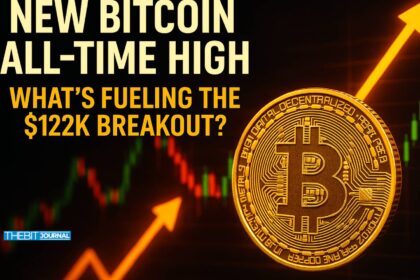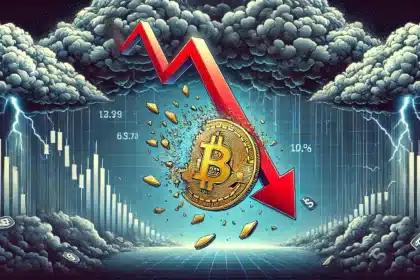Having filed with the United States Securities and Exchange Commission for listing and trading of the CoinShares XRP ETF shares, Nasdaq is one step closer to bringing the Exchange-Traded Fund for XRP to market. The XRP ETF, a Delaware Statutory Trust, allows an investor exposure to XRP without holding it directly. The ‘ETF would track the Compass Crypto Reference Index XRP – 4 pm NY Time, with assets held in safe custody by a third-party custodian.

Sources say the Nasdaq filing is disclosing the depth and liquidity of the XRP market and that it’s less susceptible to manipulation, unlike most other cryptos. The commission is reviewing ETF applications for various assets in the digital asset space so the decision on this XRP investment product will be closely watched.
Why Nasdaq Believes XRP Is a Strong ETF Candidate
According to reports, Nasdaq said XRP’s trading volume and decentralized network makes manipulation of the cryptocurrency not possible, unlike previously approved Bitcoin and Ethereum ETFs. The filing states:
“XRP is not particularly susceptible to manipulation, especially as compared to other approved ETP reference assets.”
Nasdaq’s main arguments are:
– Deep Market Liquidity: XRP is traded on many global exchanges, making price manipulation hard to do.
– Decentralized: Unlike other digital assets, XRP operates on a distributed network so any single point of control is less likely.
– Regulatory Precedent: The SEC has already approved Bitcoin and Ethereum ETFs, they are open to well-structured crypto investment products.
Compared to BTC and ETH ETFs, Nasdaq is trying to make the case for XRP being a recognizable ETF asset, similar in nature to already approved SEC offerings.

SEC’s Position on XRP and Uncertainty Over Regulations
SEC’s Position on XRP has been the source of many legal battles lately, especially the high-profile lawsuit against Ripple Labs. The regulatory body accused Ripple of selling XRP as an unregistered security. These allegations led to a years long court battle that ended with a partial win for Ripple.
However, XRP’s regulatory standing is still not clear, what would be the SEC’s reaction to this Nasdaq filing? From the in-flight appeal of the Ripple case to the flux in the federal regulatory landscape, some industry experts say it might not come soon.
Will the SEC Actually Approve an XRP ETF?
The SEC has not confirmed XRP as a universally accepted security, but in general, it has kept a very aggressive stance toward crypto regulation. With the approval of Bitcoin and Ethereum spot ETFs, they have created a precedent that industry experts believe could potentially lead to XRP being next in line.
If endorsed, the XRP ETF will open up a channel to institutional investors for the very first time to invest under regulation in exposure to XRP, therefore increasing uptake and price stability for the asset.
How an XRP ETF Could Impact the Market
1. Increased Institutional Adoption
Approval of an XRP ETF will probably attract institutional investors who, until now, kept their distance from the crypto market due to uncertain regulations. In general, ETFs are a more familiar and regulated investment vehicle, so exposure to XRP will be easier for hedge funds, asset managers, and even retail investors.
2. Possible Price Spike
Historically, ETF approvals have been catalysts that drive crypto assets to the upside. Case in point, Bitcoin had a big jump in price after its ETF approval; Ethereum had increased demand after some ETF approval rumors. So if this XRP ETF is approved, then analysts think XRP’s price could surge.
3. Regulatory Clarity for XRP
An approval from the SEC would cement XRP’s legal status in the US, possibly putting some of the uncertainties that have surrounded the asset since the Ripple lawsuit began to rest. This could lead to broader financial adoption and mainstream integration.
Challenges Facing XRP ETF Approval
Despite the benefits, XRP ETF faces regulatory and market hurdles, including:
– Legal Uncertainty: The ongoing SEC case against Ripple can block the intent to approve an ETF.
– Market Volatility: This crypto market is extremely unstable; XRP, in particular, has been seeing huge fluctuations in the past months.
– Conservative SEC: Traditional and very reserved in approving every type of crypto financial product-excluding BTC and ETH.

Industry Reaction to XRP ETF Filing
Optimism minus wariness. According to some analysts, a deep liquidity framework and institutional investor backing will likely boost the chances of approval, while others were more skeptical about regulatory hurdles.
“The filing for an XRP ETF is a big step forward, but ultimately it’ll be a call of regulatory clarity,” said James Seyffart, ETF Analyst at Bloomberg Intelligence.
Meanwhile, Ripple executives are mum about the filing, but the company has been very supportive of institutional XRP adoption.
What’s Next? – SEC Review Process Begins
SEC is reviewing the Nasdaq filing, which means:
– They will solicit public comments on the proposal.
– They have up to 240 days to make a final decision (including extensions).
– Market participants will be looking for regulatory updates.
As institutional interest in crypto ETFs grows, the decision on XRP ETF will set the tone for future filings for other digital assets, including Solana (SOL) and Dogecoin (DOGE) which Grayscale has also proposed as ETF candidates.
Conclusion
Nasdaq’s filing for an XRP ETF is a turn-around for the crypto space, paving the way for mass institutional adoption and accreditation of XRP in financial markets. While regulatory hurdles are still there, the depth of liquidity and decentralization of XRP will support the case for approval.
In the coming days as the SEC reviews the application, the crypto community waits to see what could change the game.
The BIT Journal is available around the clock, providing you with updated information about the state of the crypto world. Follow us on Twitter and LinkedIn, and join our Telegram channel.
FAQs
1. Why is Nasdaq filing for an XRP ETF?
Nasdaq thinks XRP’s liquidity and decentralization make it a strong ETF candidate just like Bitcoin and Ethereum ETFs.
2. How does an XRP ETF benefit investors?
The ETF allows investors to be exposed to XRP without direct ownership, regulation, better security and easier access.
3. What is the risk in an XRP ETF?
Regulatory uncertainties, SEC resistance, and market volatility could impact the approval and performance of the ETF in the future.
4. When will the SEC decide on the XRP ETF?
The application gives the SEC 240 days to review, and thus, the decision might come later this year 2025.
Glossary
XRP ETF: A fund that provides ‘exposure to XRP without the need to hold XRP directly.
SEC: The US regulatory ‘body that regulates securities markets and is in charge of approving or disapproving an ETF application.
Liquidity: The’ ability of an asset to be bought or sold in the market without moving the price. Generally this is a requirement for ETFs.
Custodian: Any financial institution’ or service provider that is responsible for the safekeeping and administration of assets of the ETF.
Market Manipulation: An attempt to ‘fake the price of a financial asset, usually through fraud, also included in SEC consideration when reviewing ETF filings.




























